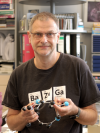Invited speakers > Keynote speakers
|

|
Pavel A. Dub serves as a Senior Principal Scientist and Product Manager for Reactivity & Catalysis at Schrödinger, Inc. He holds a PhD in Chemistry from the A. N. Nesmeyanov Institute of Organoelement Compounds, as well as a second PhD from the Université de Toulouse. Following two postdoctoral fellowships at the Tokyo Institute of Technology and the Los Alamos National Laboratory, where he later held a position as Staff Scientist, Pavel A. Dub joined Schrödinger, Inc. in 2022. His research endeavors encompass computational molecular chemistry across classical and quantum computers.
|
|

|
Vera Krewald obtained her PhD under the supervision of Prof. F. Neese and Dr. D. A. Pantazis at the MPI for Chemical Energy Conversion in Mülheim an der Ruhr, Germany, having worked on the water splitting reaction in natural photosynthesis. After a Marie-S.-Curie postdoctoral stay in the group of Prof. L. González, University of Vienna, Austria, she began independent research as a 50th Anniversary Prize Fellow at the University of Bath, UK, in 2017. Since December 2018, she has a professorship for theoretical chemistry at TU Darmstadt, Germany.
Research in the Krewald group focusses on the electronic structure analysis of open-shell transition metal complexes and catalysts using density functional theory and wavefunction methods. A central topic is the light-driven activation and transformation of dinitrogen and azides, for which the underlying photophysical and photochemical processes are analysed. Computational spectroscopy is relevant in all research projects, most recently with Mössbauer spectroscopy as a tool for the identification of active sites in the oxygen reduction reaction of graphene-embedded iron catalysts. Her group also investigates fundamental properties of oligonuclear transition metal complexes, including magnetic coupling and electron transfer pathways, with modern computational tools.
|
|

|
Marcel Maeder has been actively involved in inorganic kinetics for a long time. Starting with his PhD in Basel, Switzerland, where he investigated the reversible reactions between Co(II) complexes and O2. He realized early on that experimental efforts can be reduced by using suitable software for the analysis of the measurements. Consequently, being a bit lazy, he continued developing software tools that support kinetic investigations and make experimental work easier. In fact, this resulted in the development of appropriate software that eliminates the necessity of using inert salts and buffers, meaning that no more ionic strength and buffer dependencies need to be incorporated in experimental design. Further, appropriate software may allow the investigation of otherwise ‘invisible’ reactions; consider, as an example the lack of kinetic data on Zn(II) complexation kinetics.
Marcel Maeder moved the Newcastle, Australia, to enjoy an academic position as well as the lifestyle only available in a country with sparse population (he has a large garden, including chickens and bees, all withing cycling distance to the Uni). He resumed investigating complexation kinetics as well as equilibrium studies, continuously further developing the analysis software. During the last years of his academic career, he started investigating the aqueous chemistry of CO2. It was crucially important to realise that CO2 reacts in exactly the same way as metal ions. CO2 chemistry it is coordination chemistry applied to an organic Lewis base.
Towards his retirement Marcel Maeder decided work on the development of a set of software tools (the ReactLabTM family) for the analysis of kinetic and/or equilibrium investigations, supporting the analysis of data acquired using different techniques. Presently, the development concentrates on software for the analysis of NMR data. All this has kept him busy and happy. One day the set will be complete. What to do next?
|
|

|
Christine J. McKenzie, Department of Physics, Chemistry and Pharmacy, University of Southern Denmark, Odense, Denmark. She obtained her B.Sc.Ed, B.Sc.(Hons) and Ph.D. (1990) from the University of Melbourne, Australia. After a post-doctoral position at Odense University, Denmark (1991-1994), she became Assistant, then Associate Professor (1995-2005), and obtained a full Professorship in 2006 at the University of Southern Denmark. Her research interests lie primarily in synthetic coordination chemistry, with applications across bioinorganic, materials and supramolecular chemistry. Recognition of the obvious parallels between the constraints imposed on first row transition metal ions by chelating ligands and those by proteins inspires the synthesis of bioinorganic model systems, many based on new ligands with features designed for specific function. Small molecule activation in the solid, solution and gas phases of Mn, Fe, Co and Cu complexes has been observed and labile catalytically relevant intermediates characterized. The work has seen ramifications in a range of areas such as spin switches, metal tags for the recognition of phosphorylated proteins, chemisorptive gas-solid reactions, gas phase metal chemistry, catalysis of water oxidation and O2 reduction, terminal oxidant activation, C-H activation, water remediation from organic pollutants using iron complexes and light-promoted chemistry. Chelating ligand design for the implementation of new metal isotope pairs for PET/SPECT theranostic pharmaceuticals, and the use of coordination compounds for energy storage and electrocatalysis are recent new directions.
|
|

|
Siegfried Schindler earned his Ph.D. at the Technical University in Darmstadt, where he was introduced to inorganic reaction mechanisms in the research group led by Professor Horst Elias. He then pursued a postdoctoral position alongside Dr. Carol Creutz at Brookhaven National Laboratory (New York, USA) before returning to Germany. There, he obtained his Habilitation under the guidance of Professor Rudi van Eldik at the University of Erlangen-Nürnberg.
Since 2002, Dr. Schindler has been a professor of inorganic chemistry at the Justus-Liebig University in Gießen. His research group focuses on investigating copper and iron complexes as model compounds for metalloenzymes involved in selective oxygenation reactions, such as methane monooxygenase or tyrosinase. A particular area of interest is the detection and characterization of reactive intermediates, including superoxido complexes, formed during the reaction of copper(I) or iron(II) complexes with dioxygen. Detecting these reactive species often requires low temperatures (as low as -140 °C), and kinetic measurements for establishing reaction mechanisms are conducted using low-temperature stopped-flow techniques.
In addition to their fundamental research, the Schindler group aims to apply their findings to enhance existing industrial processes. For instance, they are investigating the oxygenation of toluene to benzaldehyde, seeking to improve current industrial procedures through the application of their research results.
|
|

|
Kylie Vincent is Professor of Inorganic Chemistry at the University of Oxford. She has over 20 years research in bio-inorganic chemistry with a particular focus on enzymes responsible for hydrogen-cycling in biology. Her group have developed new approaches for combining spectroscopic and structural methods with electrochemical control in mechanistic study of metalloenzymes, in particular for understanding proton-coupled electron transfer (PCET) steps in bio-inorganic mechanisms. Prof Vincent has also established biotechnology solutions for cleaner chemical manufacturing via biocatalytic hydrogenation reactions, leading her to co-found the University spin-out company, HydRegen, in 2021. She is a passionate supporter of diversity in science and enterprise, serving as the University of Oxford’s Academic Champion for Women in Entrepreneurship and as Associate Head (People) for the Department of Chemistry. She is an Associate Director for Oxford’s Inorganic Chemistry for Future Manufacturing Centre for Doctoral Training.
|
|
|
|
|


